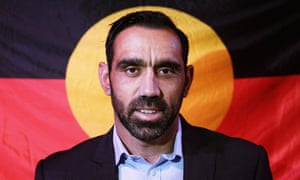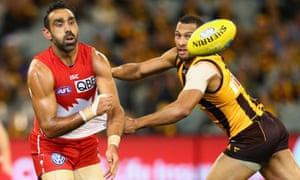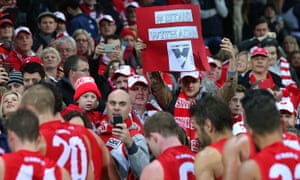Extract from The Guardian

Adam Goodes walked away from his stellar AFL career due to the abuse he constantly suffered and is now the subject of a powerful new film
by Donald McRae
by Donald McRae
Great sportsmen divide their lives into little boxes. A ruthless competitive drive goes into one box, a corporate smile in another, a life away from the tangled business of sport belongs to a more private compartment. The best can do this easily and Adam Goodes, the former Australian rules footballer, belonged among the elite. Goodes twice won the Brownlow medal, awarded each season to the best football player in the country. He won two Premierships with the Sydney Swans and played more games in the Australian Football League than any other Indigenous footballer. In 2014 he was named Australian of the Year.
Goodes is now 40 and, four years ago, persistent racial abuse forced his early retirement. He was still an imperious player but he could no longer bear the hurt whenever he was booed and taunted with the certainty that it was fuelled by racism. Last year the AFL apologised to Goodes for failing to intervene. That apology, sparked by two powerful documentaries about the way he had been hounded from the game, arrived too late.
"I’ve tried to go to games and I haven’t enjoyed it. It’s really sad, because my godchildren love going to the football"
A thoughtful and gracious man who rarely gives interviews, Goodes pauses when asked if he can separate his previous love of the sport from his bruised feelings towards the AFL. “Unfortunately not. I’ve tried to go to games and I haven’t enjoyed it. It’s really sad, because my godchildren love going to the football. These are the kids of Michael O’Loughlin [another Sydney Swans icon and Goodes’s cousin]. They always ask me to go, and I feel really bad about not sharing that time because I adore them. I have other things to do, with [his eight-month-old daughter] Adelaide and my wife Natalie. I also spend lots of time with my godchildren, doing things unrelated to the game.”Goodes is now 40 and, four years ago, persistent racial abuse forced his early retirement. He was still an imperious player but he could no longer bear the hurt whenever he was booed and taunted with the certainty that it was fuelled by racism. Last year the AFL apologised to Goodes for failing to intervene. That apology, sparked by two powerful documentaries about the way he had been hounded from the game, arrived too late.
"I’ve tried to go to games and I haven’t enjoyed it. It’s really sad, because my godchildren love going to the football"
Can Goodes imagine these feelings towards football changing? “They haven’t yet done, so…”
His voice trails away. But Goodes is intelligent and reasonable. “It’s only been four years. Who knows? They do say time heals.”
When he was a boy, football offered Goodes joy and inclusivity. But between 2013 and 2015, at his peak, it became a divisive battleground of racism. “It completely was,” Goodes says. “As a kid we moved around a fair bit as a family. It was difficult to make friends, but sport helped. Once people saw you kick a football it broke down barriers. Instead of being the new skinny black kid you were the kid everyone wanted on their team. That really helped break those barriers as we moved from one small country town to another. The football field was a place where I could express myself and just be me. Play the game as well as you can and that’s what you’re judged on. Not the colour of your skin, or your beliefs, or the conversation you have around racism.”
On 24 May 2013, Goodes and the Swans played Collingwood in the AFL’s annual Indigenous Round which is meant to celebrate diversity. As he ran towards the touchline a Collingwood supporter yelled that he was “an ape”. Goodes pointed straight at the fan. She was a 13-year-old girl who was escorted from the arena by stewards.

After the game Goodes was measured. He bore no animosity and he said the girl should call him so that they could have a conversation about why he had been hurt by her insult. But the footballer did not shy away from saying she represented the face of racism. Despite being the victim, Goodes was vilified by some as a bully.
“Whenever I had been racially vilified before it had been by peers or drunk men,” Goodes says. “It’s more shocking when it’s a 13-year-old child. No 13-year-old is racist. Saying she was the face of racism was me explaining that this innocent person reflected the adults around her. I don’t blame her. When she called me, I accepted her apology and spoke to her about how she made me feel. We had a really good discussion and I knew she was just copying people – because she told me they were saying this in the crowd.”
The abuse of Goodes escalated. This was not the pantomime booing of the opposition’s best player. It was racist goading. In May 2015, after scoring against Carlton, Goodes did a defiant Indigenous war dance. “Being booed for two years was tough. In the first year, 2014, the Swans finished top of the table. That was my FU to the booing. I walked off with my head held high. We then got absolutely smashed by Hawthorn in the grand final. The vilification from the Hawthorn supporters was really bad.
“You get to a new year and think: ‘Cool, here’s another opportunity to play a final.’ The first game in, the booing was still there. I was shocked but in the early part of that season we were winning. Then, mid-season we played Hawthorn, that team with the disgusting fans, and lost in Sydney.
“We then played West Coast Eagles and the booing was like a howl. We got thumped and I was up the whole night, thinking this could be my last year of football. I felt like an absolute piece of crap. I was an emotional wreck. I didn’t want to go to training that Monday morning. I never had that feeling in 18 years of playing. I called the coach and he brought around my best mate and I broke down. I was like: ‘I can’t do this any more.’ I needed to get away.”
In August 2015 Goodes travelled to the Flinders Ranges in the South Australian outback. There, he reconnected spiritually and emotionally with his ancestors who had lived in Australia for 60,000 years before the British arrived in 1770. “Flinders Ranges, this very spiritual place, helped me ground myself. I became clear that this would be my last season. I was going to exit the game.”
Goodes played seven more games for his beloved Swans. No one, apart from the Swans’ chief executive, knew of his decision. There was simply an outpouring of love as people wore his No 37 shirt and held up banners saying: “I Stand with Adam.”
His final game was a semi-final defeat against North Melbourne in September 2015. Afterwards, Goodes told his teammates he could never play again. “They were sad for what happened to me,” he recalls. “They had been alongside me the whole way and seen how much it affected me. It affected them too. Everyone felt bad but I felt a sense of excitement that I didn’t have to be subjected to that shit any more.”
Goodes is now doing transformative work with the Indigenous Defence and Infrastructure Consortium, which he founded, as he helps “Indigenous businesses work in the defence sector. I’ve also partnered with a company called Nogard and become the majority shareholder. No other indigenous business is doing this in Australia as we import industrial and safety goods from around the world.”
His warmth and optimism is most obvious when he talks about his family – and the fun he has playing basketball in an over-35s league in Sydney with his team, the Vikings, who feature former Swans stars, including O’Loughlin. “I still love having a good blow out. We’re super-competitive as you can imagine.”
Playing against teams made up of accountants and builders, Goodes says: “We’ve made the grand final a couple of seasons and we’re winning our fair share. I’m now doing pre-season with Waverley Old Boys in what you call football in England. I grew up playing soccer and it’s definitely my first love. I loved competing in the AFL but even then I followed the Premier League and Champions League.”

He flies to London this month when An Australian Dream opens in the UK but Goodes admits the film is too painful for him to watch again. The documentary allows contrary voices to express criticism – with the implication being he should have shrugged off the racism. I ask Goodes about the inclusion of Andrew Bolt, the abrasive TV host, and Eddie McGuire, Collingwood’s president. “Try and get a comment from those guys,” he suggests. “Ask how far they’ve come in these four years.”
I emailed Bolt and McGuire, to ask if they had watched the film and if their views of Goodes had changed. Neither responded.
However, as Goodes says: “Lots of people who watched the documentary have become more aware of our history. Last Sunday night it was screened on free-to-air television. The educational message is coming through and that really pleases me.”
Goodes believes that, in the way it embraces its Indigenous Maori, “New Zealand is light years ahead of Australia. They have ensured sovereignty of [Maori] land, and made sure Indigenous people are acknowledged in the constitution. When are we going to be recognised in our constitution? When are we going to have sovereignty of our own land returned? We’re the only Commonwealth country that doesn’t have sovereignty for its first people.”
Captain Cook’s declaration in 1770, that Australia comprised “empty lands”, was a lie that haunts Goodes. “Our people have had their land taken from them, from the moment they were colonised. It’s the truth. We have mining companies making billions of dollars from Aboriginal land. We have Indigenous people who are 40 times more likely to experience domestic violence, 10 times more likely to die from those experiences, 14 times more likely to go to jail. We’re dying 10 years younger than non-Indigenous people. All this tracks back to colonisation.
“New Zealand gives us the perfect example. They were colonised as well. But they were acknowledged. They had the treaty. They were written into the constitution which insists they teach Maori culture in schools.”
Does he have hope the Australian constitution will be changed? “That movement’s been parked for now. I’m trying to make a real difference in growing wealth for Indigenous people. We’re trying to move away from welfare dependency and unfortunate disadvantage lots of our people live in today.”
When Goodes accepted being named as the Australian of the Year in 2014 he highlighted the scars of his country’s racial history. He also said: “Racism stops with me.”
His stance cost him the end of his sporting career but Goodes has no regret. “When I compare my mother’s journey to the journey awaiting my daughter, I can see that every generation has so much more knowledge. Knowledge is power. That is how we become stronger. Understanding how hard it has been for my mother to deal with the trial of her upbringing, and being taken from her family when she was five, we don’t judge her for not telling us when we were young. People need to understand what happened to the children of a stolen generation. That trauma never leaves them. It’s the same with the ongoing trauma of racism. Instead of masking racism, we need to deal with it day-to-day. It’s how we beat it.”
The Australian Dream is in cinemas in the UK and on demand 27 March www.theaustraliandream.co.uk/. It can be viewed in Australia on ABC iview.
No comments:
Post a Comment